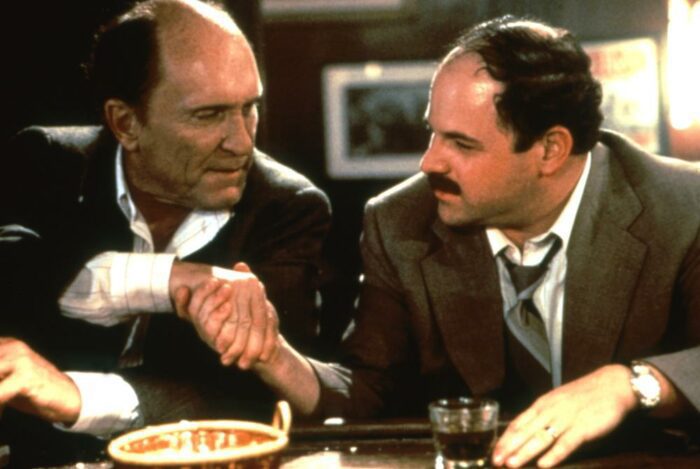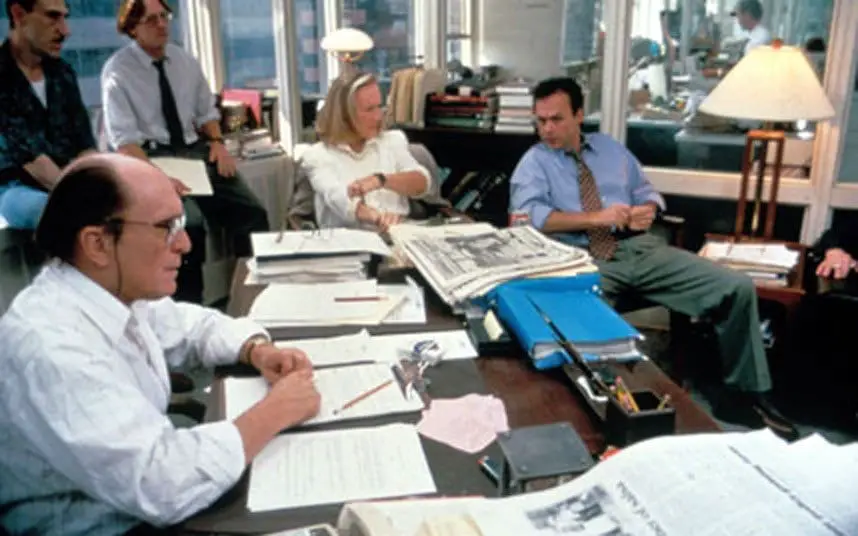Remember when we treated journalists as flesh and blood people? Not so long ago—the 1990s to be more precise—we did just that. They were more than faces on our TV screens or bylines, these purveyors of events both home and abroad were given respect. It was an outright belief that above all they were human beings, just like us. A film like The Paper feels more like a time capsule to that time and a love letter to the ideals we once welcomed in society. Before being force-fed a steady diet of battle lines, death threats, divisive rhetoric, bigoted pundits and win-at-all costs mentalities, the news was above the fray. Whether we liked it or not, there it was in black and white for all to see. Make no mistake, this world in the film was “a circus”, but one without an omnivorous mammal holding its paw to our throats.
If there is one sliver of similarity between the film and current reality, it’s the notion that life can change in 24 hours; the theme that heavily winds its way through every detail of this chaotic day. We feel the rhythm of our own clocks and heartbeats as the drama, as well as comedy, ramps up. Hard not to see that same time clock running faster in our frenetic paced world; what once seemed like an eternity now feels like mere seconds. Breaking news now signifies everything from a fender-bender to government corruption. It all comes down to the people behind the story.
Two young African American men (played by Vincent D’Arbouze and Michael Michael) are in the wrong place at the wrong time. They flee when confronted by the screams of a woman coming onto the scene of the crime; we the viewer know they merely happened upon a murder. The Paper is not a tale of two men fighting against injustice and ultimately it is totally about them. One short piece of dialogue as they stand among the cramped conditions of their new jail cell during lights out is really all you need to understand the consequences of false perceptions. Fear and confusion in those brief moments convey more than any pages long monologue could reveal. Their narrative—as is so many in their position—rests in the hands of strangers. It’s the typical news story that runs on sensation and vanishes when the realities fail to reflect the crowd’s lust for blood; everyday acts that go down with the flush of stereotypical sugar that feeds the masses. This counts too, it’s the important stuff that ultimately gets lost far too often for agendas: personal, professional, and political. Where their lives hang in the balance rests on one busy newsroom in the heart of the city.
In the morning, Henry Hackett(Michael Keaton) and his very pregnant wife Martha(Marisa Tomei) start out the day in their New York apartment; the conversation is as common as any of us have with our significant others. It’s a brilliant beginning by the film’s screenwriters David Koepp and Stephen Koepp to bring viewers into the story, not at the newsroom but the apartment far away yet totally connected to the news, as a TV blares throughout the space. Later on, Henry ventures into the congested newsroom with all the usual emotions that editors can empathize with; it’s the unrelenting questions and chaos that both excites and tires out the most resilient souls. Just as the film stresses, every moment matters, every second is another one closer to that deadline, that all important 24th hour. At home, Martha clamors for those very things, even making an appearance in her former home turf. As if she’s been reluctant to think about the changes in her life, they come charging in with complete fury; the not so uncommon situation that demands attention as an emergency unfolds.

The cliche of the older, but wiser editor is given its own reconstruction for the ’90s. Our first glimpse of Bernie White(Robert Duvall) only seeks to be a red herring that we’ll be treated to the usual hardened character without context or background; he is battling his own demons of the physical and emotional kind. While the early meeting scene could easily go with the higher moral voice or leader without flaw, it instead reels us in to reveal that moment where his cough stops everyone in their tracks. This man, who probably was once an indestructible and fierce presence in the newsroom is finally showing the cracks of true frailty (ultimately mortality) in a way that is clear to everyone. As he comes to grip with a difficult diagnosis, it appears clear that he wants to build back the bridges once burned to the ground. Once again, the film only gives us a nugget of information here and there as he struggles to find a way back into his daughter’s life. As he looks through the window to see her family, complete with a grandchild, almost an embrace of the family he built at work as she accepts her delivery of the newspaper he helps to build everyday.
Women are portrayed across a spectrum of personalities in The Paper, but one of the most striking is Alicia Clark(Glenn Close). She’s smart, fearless, and determined to command the respect of colleagues; more importantly, she is at war with her values, her past, her determination, and ultimately the definition of success as conveyed to others. A zeal for getting out the paper overrides the very ideals that helped propel her to success; a factor that she faces head-on with an all too timely realization. As Clark feels the force of a bullet mistakenly fired in her direction, by someone aggrieved by one of the paper’s pieces no less, it’s almost a karmic reminder that the daily dose of news has consequences. There are people at the heart of every story and fine lines that defy any sort of stereotypes or easy to resolve conclusions.

Another day for this newspaper ends with an attention-drawing headline that highlights the innocence of two men; it wasn’t the easy thing to do, it was the right thing to do. We’re only given this one day in the characters’ lives; deciding what happens next is completely up to the imagination. Of course, there is another story that day and every day after; that’s what we forget in the 24-hour news cycle that fuels our passions and makes us forget to search for truth. Journalists are people, flawed and imperfect just like you or I. They have families, dreams, goals, failures, successes, moments they’re sure they should give up and every other emotion possible, someone’s husband, wife, brother, sister, father, mother, son, daughter, and the list goes on and on. If The Paper can accomplish anything 25 years after its release, it is to remind everyone that the only “enemy” is the one we create in our imaginations and prejudices.


